|
 Secure Site
Secure Site
|
 |
Archive for the 'Bamboo Chime Clocks' Category
 How to Improve Your Brain - Use Your Meditation Timer Want to build a better brain? Ramp up your spiritual practice, says Andrew Newberg, a neuroscientist at the University of Pennsylvania. Meditation and prayer can improve your physical, intellectual, and emotional well-being and may even slow the brain’s aging process.
Newberg, who is also the director of the Center for Spirituality and the Mind, is the author of four books, including the recently released “How God Changes Your Brain,” which discusses the results of brain scans that he and his team conducted on more than 100 meditating or praying people. The research shows that the physical and emotional benefits of spiritual observances dramatically accrue over years of practice, but even recent converts exhibit healthier brains — in one study Newburg’s team scanned the brains of people who had never meditated before, then taught them simple meditative methods. After eight weeks of meditating 12 minutes a day, an evaluation showed considerable improvement in memory scores and a measurable decrease in anxiety and anger.
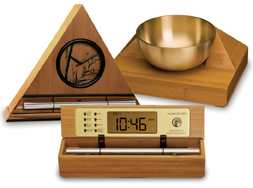 Chime Timers and Meditation Clocks adapted from SFGate.com by David Ian Miller, 4/2009
Using a kitchen timer or beeper watch is less than ideal. And it was with these considerations in mind that we designed our digital Zen Alarm Clock and practice timer. This unique “Zen Clock” features a long-resonating acoustic chime that brings the meditation session to a gradual close, preserving the environment of stillness while also acting as an effective time signal.
Now & Zen’s Meditation Chime Clocks & Timers
1638 Pearl Street
Boulder, CO 80302
(800) 779-6383
Posted in Bamboo Chime Clocks
 Cherry blossoms Researchers recently found that minutes-long meditation increases blood flow to the region of the brain that’s linked to learning and memory. In the morning, meditate for ten to 12 minutes before your cup of coffee or tea. (Caffeine can slow blood circulation to the brain.) Sit comfortably, let your eyes close and focus on your breath. If your thoughts start to wander, bring your attention back to your breath.
adpated from Natural Healing Magazine, November 2008
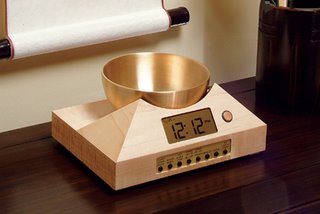 Zen Timepiece, a brass singing bowl clock and timer Now & Zen’s – The Zen Clock & Meditation Timer Sore
1638 Pearl Street
Boulder, CO 80302
(800) 779-6383
Posted in Bamboo Chime Clocks, Chime Alarm Clocks, intention, Meditation Timers, Meditation Tools, Now & Zen Alarm Clocks, Well-being, Yoga Timer, Yoga Timers by Now & Zen
 meditation reduces stress Dhyana heyah tad vrttayah.
Meditation removes disturbances of the mind. (Yoga Sutra II.11)
Research also shows that meditation can help people with anxiety disorders. Philippe Goldin, director of the Clinically Applied Affective Neuroscience project in the Department of Psychology at Stanford University, uses mindfulness meditation in his studies. The general practice is to become aware of the present moment—by paying attention to sounds, your breath, sensations in your body, or thoughts or feelings—and to observe without judgment and without trying to change what you notice.
Like most of us, the participants in Goldin’s studies suffer from all sorts of disturbances of the mind—worries, self-doubt, stress, and even panic. But people with anxiety disorders feel unable to escape from such thoughts and emotions, and find their lives overtaken by them. Goldin’s research shows that mindfulness meditation offers freedom for people with anxiety, in part by changing the way the brain responds to negative thoughts.
In his studies, participants take an eight-week mindfulness-based course in stress reduction. They meet once weekly for a class and practice on their own for up to an hour a day. The training includes mindfulness meditation, walking meditation, gentle yoga, and relaxation with body awareness as well as discussions about mindfulness in everyday life.
Before and after the intervention, participants have their brains scanned inside an fMRI (or functional MRI) machine, which looks at brain activity rather than the structure of the brain, while completing what Goldin calls “self-referential processing”—that is, thinking about themselves. An fMRI scanner tracks which brain areas consume more energy during meditation and, therefore, which regions are more active.
Ironically, the brain-scanning sessions could provoke anxiety even in the calmest of people. Participants must lie immobilized on their back with their head held in the brain scanner. They rest their teeth on dental wax to prevent any head movement or talking. They are then asked to reflect on different statements about themselves that appear on a screen in front of their face. Some of the statements are positive, but many of them are not, such as “I’m not OK the way I am,” or “Something’s wrong with me.” These are exactly the kinds of thoughts that plague people with anxiety.
The brain scans in Goldin’s studies show a surprising pattern. After the mindfulness intervention, participants have greater activity in a brain network associated with processing information when they reflect on negative self-statements. In other words, they pay more attention to the negative statements than they did before the intervention. And yet, they also show decreased activation in the amygdala—a region associated with stress and anxiety. Most important, the participants suffered less. “They reported less anxiety and worrying,” Goldin says. “They put themselves down less, and their self-esteem improved.”
 reduce stress with meditation Goldin’s interpretation of the findings is that mindfulness meditation teaches people with anxiety how to handle distressing thoughts and emotions without being overpowered by them. Most people either push away unpleasant thoughts or obsess over them—both of which give anxiety more power. “The goal of meditation is not to get rid of thoughts or emotions. The goal is to become more aware of your thoughts and emotions and learn how to move through them without getting stuck.” The brain scans suggest that the anxiety sufferers were learning to witness negative thoughts without going into a full-blown anxiety response. Research from other laboratories is confirming that mindfulness meditation can lead to lasting positive changes in the brain. For example, a recent study by Massachusetts General -Hospital and Harvard University put 26 highly stressed adults through an eight-week mindfulness-based course in stress reduction that followed the same basic format as Goldin’s study. Brain scans were taken before and after the intervention, along with participants’ own reports of stress. The participants who reported decreased stress also showed decreases in gray -matter density in the amygdala. Previous research had revealed that trauma and chronic stress can enlarge the amygdala and make it more reactive and more connected to other areas of the brain, leading to greater stress and anxiety. This study is one of the first documented cases showing change ocurring in the opposite direction—with the brain instead becoming less reactive and more resilient.
Together, these studies provide exciting evidence that small doses of mental training, such as an eight-week mindfulness course, can create important changes in one’s mental well-being.
adapted from Yoga Journal, by Kelly McGonigal
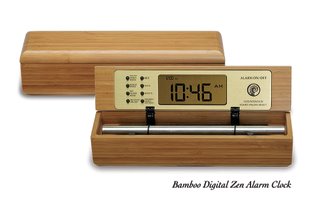 Bamboo Digital Zen Alarm Clock by Now & Zen Now & Zen’s Meditation Timer Store
1638 Pearl Street
Boulder, CO 80302
(800) 779-6383
Posted in Bamboo Chime Clocks, intention, Meditation Timers, Meditation Tools, mindfulness practice, Now & Zen Alarm Clocks, Well-being, Zen Timers
 Yellow Flowers. c. 1900, unknown Exhaustion Cause: Disconnection from Nature
It’s hard to feel tired or anxious while hiking in the wilderness or staring out at a blue expanse of ocean. “Nature has built-in mechanisms for relieving stress,” says Doreen Sweeting, M.D., founder of Psychosomatic Wellness Intuitive Life Coaching. “There’s aromatherapy in the scent of the pine trees and grass, chromatherapy in the colors of the rocks and sky and flowers, sound therapy in the birdsong and wind rustling the leaves.”
Our society, unfortunately, is increasingly cut off from this wellspring of energy. “We live in artificial light. We walk on concrete. We exercise on machines,” Sweeting says. “We go from home to work to the store and back home.”
Exhaustion Cure: Take a Morning Walk
Set your Zen Timepiece to remind you whether you live in a suburb or a bustling city, to take a walk first thing in the morning — if possible, in an area filled with trees. “You’ll feel the energy of nature replenishing you,” says Sweeting. “The tree huggers are on to something.” As often as possible, venture deeper into the woods by planning day hikes or overnight camping trips.
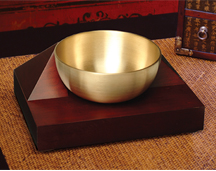 Signing Bowl Timers & Alarm Clocks Make an extra effort to notice the changing seasons. “You’ll start to realize the rhythms of nature apply to you, too,” Sweeting concludes. “When you harmonize yourself with nature, you’ll develop a stronger sense of well-being. The body responds quickly to being honored in this way. And it can all start with getting out to the park.”
adapted from Body+ Soul Magazine, September 2009
 Zen Chime Alarm Clock, Digital Black Lacquer Chime Clock Now & Zen’s Singing Bowl Clocks & Timers
1638 Pearl Street
Boulder, CO 80302
(800) 779-6383
Posted in Bamboo Chime Clocks
 yoga supported fish pose Beat the Blues
You can see next week’s deadlines and responsibilities building up like a wave about to crest.
Take a few moments of silence to coil your energy before you dive into another week. This pose helps ward off the Monday-morning blues, inviting energy into your body and mind.
Supported Fish
What It Does
Stretches the shoulders, neck, and chest; improves posture and deepens breathing, countering a forward hunch. Opens the heart and the throat chakras, bolstering courage and encouraging authentic expression.
How to Do It
Set your Zen Yoga Timer in Bamboo to chime after 5 minutes. Roll up a thin blanket and lie on your back, resting your shoulder blades on the blanket. If your head doesn’t comfortably reach the floor, place another blanket or small pillow underneath.
Let your breath rise and fall naturally, and stay here for 5 minutes, or as long as you like.
adatped from Body + Soul, 2010
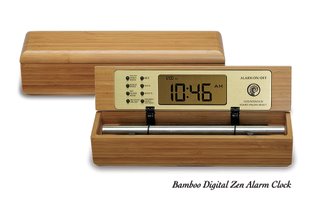 Bamboo Digital Chime Clock, a calming timer and alarm clock made from natural materials like bamboo, walnut, and maple Now & Zen’s Yoga Timer Store
1638 Pearl Street
Boulder, CO 80302
(800) 779-6383
Posted in Bamboo Chime Clocks, Japanese Inspired Zen Clocks, Meditation Timers, Meditation Tools, Now & Zen Alarm Clocks, Yoga Timer, Yoga Timers by Now & Zen
 lovingkindness meditation Put it into practice.
Sit comfortably in a place where you won’t be disturbed. Take three to five quiet breaths. Gently close your eyes.
Imagine the horizon spanning through your chest with a radiant sun rising in your innermost center—your heart. As though being melted by the solar warmth, release tension in your shoulders and across your throat. Soften your forehead and rest your attention inward on the light deep within. Take 7 to 10 smooth, even breaths.
As you inhale, invite the glow from your heart to expand toward the inner surface of the body. With each exhale, let the light recede. Take another 7 to 10 peaceful breaths. Inhaling, invite the light to touch the parts of you that interact with the world—your eyes and ears, the voice center in your throat, the palms
of your hands, the soles of your feet. Exhaling, feel your light shine more clearly. As you continue to inhale and exhale, silently say: “I radiate friendliness for those who are happy, com-passion for those who are unhappy, equanimity toward all.” Continue until your attention wavers. Then, sit quietly for several minutes.
When you feel complete, place your palms together in front of your heart and bow your head. Release the backs of your hands to your thighs and lift your head. Gently open your eyes to return to the horizon of the world.
adapted from Yoga Journal, byKelly McGonigal
Use our unique “Zen Clock” which functions as a Yoga Timer. It features a long-resonating acoustic chime that brings your meditation or yoga session to a gradual close, preserving the environment of stillness while also acting as an effective time signal. Our Yoga Timer & Clock can be programmed to chime at the end of the meditation or yoga session or periodically throughout the session as a kind of sonic yantra. The beauty and functionality of the Zen Clock/Timer makes it a meditation tool that can actually help you “make time” for meditation in your life. Bring yourself back to balance.
 bamboo meditation timer Now & Zen – The Portable Meditation Timer Store
1638 Pearl Street
Boulder, CO 80302
(800) 779-6383
Posted in Bamboo Chime Clocks, intention, Meditation Timers, Meditation Tools, mindfulness practice, Now & Zen Alarm Clocks, Well-being, Zen Timepiece by Now & Zen, Zen Timers
 Utamaro Kitagawa, The Courtesan Hanaogi of Ogiya, Ukiyo-e Woodblock Print As far back as 300 B.C., the philosopher Chuang Tzu observed that when an archer was practicing, he shot with calming relaxation and skill. When a moderate financial award was placed in front of the archer, he got a little tense, his aim faltered and he often missed the target. When a large award was offered for his accuracy, he became nervous and worried, with obvious results. This led Chuang Tzu to wryly observe that, “He who looks too hard on the outside gets clumsy on the inside.”
In modern times people who play golf find their swing is near perfect when there is no ball to hit. But once a ball is placed on the tee and someone is keeping score, the inexperienced golfer’s swing inevitably fails and the ball goes off its intended path. When a golfer has a drink, he often becomes more relaxed and his game improves. So even though a specific feat can be improved by artificial means, it is at the expense of our being fully present and reduces our ability to respond to other circumstances. Imagine how our performance in everyday life would improve if we could learn to find rest and calming relaxation from within ourselves.
The question is, “How could we relax in the process of living?” or, “How can we have rest in our daily lives? How do we live for the rest of our lives?”
 Ohara Koson (Shoson) 1877-1945, Ukiyo-e Here are six resting points or techniques that can assist us in finding rest and calming relaxation, peace, tranquility, and restoration within ourselves and within the great self that embraces and holds us all. Try one and you’re on your way to the rest of your life.
1. The Breath: Following the rise and fall of your breath can bring you to a peaceful and calm place and restore your energy. It brings you present. Allow your breath all the way into your belly to reduce stress. The key to natural and full breathing is in the exhalation – the letting go. However, don’t force anything.
2. The Nap: It is very underutilized in our culture. Twenty minutes is ideal but even a five-minute nap can be very restorative. Don’t go more than 20 minutes or you may feel groggy. If you only have a minute, try this. Hold some keys in your hands and bend forward in your chair with your lower arms resting on your thighs. As you nod off, the keys will drop and wake you up. Even in that minute, you will feel a little more refreshed. The point here is that taking a little time for yourself for rest, prayer, meditation, or spiritual exercises can profoundly affect the quality of your day. Remember to set your Zen Chime Timer to awaken you gently.
3. The Pause: Learning to pause is a great tool to have up your sleeve. Its value is in bringing you consciously present. You can pause a moment in your daily routine and say, “I am present. I am here, now.” Then allow yourself to be with whatever is revealed. A further refinement is to bring your attention to the pause between exhaling and inhaling. Even doing this once will give you a moment of rest and restoration.
4. Silence: The word “listen” contains the same letters as the word “silent.” Choose to be present and alert and to listen past the inner conversations of the mind. Listen past the sounds of the world and just listen to the silence. Listen attentively to whatever comes forward out of the silence. If things start to distract and disrupt you, bring your focus back to the silence. When you practice bringing your presence into the silence, you will experience a knowing and a wisdom that will start flowing within you. It will usually bring you to a state of peace, calm and clarity.
5. Doing nothing: A great way to interrupt the pattern of habitual doing. It is akin to entering a state of observation, where you perceive things clearly just for what they are. An analogy is watching boats going out to sea. You observe them as they pass you. Then you observe the next one. If you gawk or think about how you would like to be in a boat, you have moved out of observation. Observation is only about what is, not what you know or don’t know about a situation. The power that comes from that, internally, is tremendous. It’s an active place of neutrality. The process of observing what is, is the process that releases and restores us.
6. Meditation – Resting in Yourself: “To the mind that is still, the whole universe surrenders.” Lao-Tzu. When you haven’t developed an intimate relationship with life or with yourself, you’ll tend to look toward having sex or acquiring more money, or to any attractive distraction to fill the emptiness inside. To fill yourself, you have to be prepared to spend time alone – quality time with yourself, not with a good book, not watching television, art or with music. Although those have their place, learn to be quiet with your own inner self. Any time you can bring your focus onto one thing, a flower, a sacred word, a scene in nature, you are meditating. The simplest way to meditate is to observe the rising and falling of your breath.
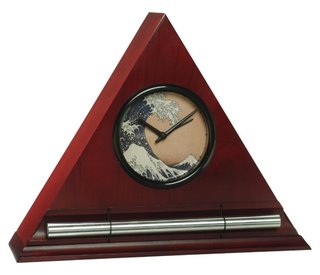 Zen Alarm Clock, Ukiyo-e Hokusai Wave Dial Face, mediation timer and clock Adapted from Men’s Health, June 2003 by Paul Kaye, DSS, President of the Movement of Spiritual Inner Awareness (MSIA)
Now & Zen’s – The Zen Alarm Clock Store
Meditation Time Shop
1638 Pearl Street
Boulder, CO 80302
Posted in Bamboo Chime Clocks, Chime Alarm Clocks, Japanese Inspired Zen Clocks, Meditation Timers, Meditation Tools, Natural Awakening, Now & Zen Alarm Clocks, prayer, Progressive Awakening, Well-being
 Peonies at Hyakken, #18 from the series 'Tōkyō Meisho Sanjurokkasen, Utagawa Shigenobu (1826 - 1869)
The bee emerging
from deep within the peony
departs reluctantly.
-Basho-
 maple meditation timer and chime alarm clock called The Zen Alarm Clock, digital style in maple
Now & Zen’s Chime
Alarm Clock &
Meditation Timer Store
1638 Pearl St.
Boulder, CO 80302
Posted in Bamboo Chime Clocks, Japanese Inspired Zen Clocks, Japanese Poetry, Meditation Timers, Meditation Tools, mindfulness practice, Natural Awakening, Now & Zen Alarm Clocks, Progressive Awakening, Ukiyo-e, Well-being, Zen Timers
 B.P. Lathrop, title and date unknown, woodblock print Sleep patterns around the world have undergone a revolution over the past two centuries as the spread of artificial lighting profoundly changed the shape of human lives, first in cities and now even in many remote villages. Throughout most of history sundown brought an end to the activities in most homes, with people crawling into bed soon afterwards.
A. Roger Ekirch—author of a magisterial history of nighttime, At Day’s Close (Norton)— argues that the very nature of a night’s rest has changed since the Industrial Revolution. Sleep for our ancestors were often divided into two shifts of roughly four hours, with a period of wakefulness lasting an hour or longer in between.
A study conducted by the U.S. government’s National Institute of Mental Health appears to confirm Ekrich’s thesis. When people in an experiment were deprived of artificial light throughout the evening and night, they began to exhibit “a pattern of broken slumber—one practically identical to that of pre-industrial households,” Ekirch writes. Researchers in the study, noted hormonal changes in test subjects and “likened this period of wakefulness to something approaching an altered state of consciousness not unlike meditation.”
We still call midnight “the bewitching hour” because pagans in Europe practicing their old religion in defiance of Christian bans secretly performed rituals in this interval between rounds sleep. But Ekrich believes this period of nocturnal time-out-of-time played an important role in the psychic lives of almost everyone as an opportunity to reflect, pray, make love, think about your dreams— contemplative activities which were impossible to pursue during days of long, hard work. Night was the time for inner explorations of spirit and soul. “By turning night into day,” he writes, “modern technology has helped to obstruct our oldest path to the human psyche.”
While it may not be practical for many of us to reclaim the sleep patterns of pre-industrial peoples, we can easily incorporate some elements of this midnight reflection into our lives. Try turning off the lights early, and spending some time alone with our thoughts before going to sleep, or doing that in the morning rather than jumping right out of bed. And if you do experience trouble sleeping, think of the time awake as a gift of contemplation rather than the burden of insomnia.
 Wake up refreshed, love your alarm clock, transform your mornings with The Zen Alarm Clock's progressive awakening with gentle chimes. Boulder, Colorado—an innovative company has taken one of life’s most unpleasant experiences (being startled awake by your alarm clock early Monday morning), and transformed it into something to actually look forward to. “The Zen Alarm Clock,” uses soothing acoustic chimes that awaken users gently and gradually, making waking up a real pleasure. Rather than an artificial recorded sound played through a speaker, the Zen Clock features an alloy chime bar similar to a wind chime. When the clock’s alarm is triggered, its chime produces a long-resonating, beautiful acoustic tone reminiscent of a temple gong. Then, as the ring tone gradually fades away, the clock remains silent until it automatically strikes again three minutes later. The frequency of the chime strikes gradually increase over ten-minutes, eventually striking every five seconds, so they are guaranteed to wake up even the heaviest sleeper. This gentle, ten-minute “progressive awakening” leaves users feeling less groggy, and even helps with dream recall.
adapted from Ode, November 2005 by Jay Walljasper
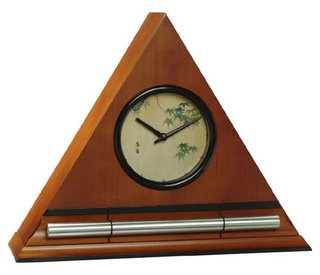 Zen Chime Clock with Japanese Maple Leaves in Honey Finish, a nighttime tool for insomniacs Now & Zen’s Alarm Clock Store
1638 Pearl Street
Boulder, CO 80302
Posted in Bamboo Chime Clocks, Chime Alarm Clocks, Japanese Inspired Zen Clocks, Natural Awakening, Now & Zen Alarm Clocks, Progressive Awakening, Sleep Habits
 Utagawa Kuniyoshi Before the electric lightbulb, people generally went to bed after dark and rose with the sun. If they stayed up after sundown, it was by the light of the fire, candle, or oil lamp—a low, warm light that eased their transition to sleep. But with the advent of electricity, light in our homes no longer matches what’s best for our bodies.
Most Americans now sleep an hour and a half less each night than they did a century ago, at great cost to health and safety, writes William Dement, M.D., Ph.D., of the Stanford University Sleep Research Center in The Promise of Sleep (Delacorte Press, 1999).
For the sake of productivity, people now treat sleep as a disposable commodity; fewer than 35 percent of American adults regularly get the seven to eight hours per night that researchers consider necessary. The irony is that burning the midnight oil actually lowers productivity by causing memory lapse, increased error rates, slower reflexes, lack of motivation, and short tempers.
When we sleep, our brains consolidate the day’s experiences into memory while our bodies re-energize our muscles and organs and regenerate cells. Researchers have identified several phases of brain-wave activity needed to experience the full benefits of slumber, yet it’s increasingly common for people to miss out on some of these stages.
 Bamboo Digital Chime Clock, a calming timer and alarm clock Researchers say we should pay attention to four primary factors in the sleeping environment:
- light
- noise
- temperature
- bed
Other factors can support your sleep haven. Soothing colors may relax your body and mind, putting you in the right mood for sleep; many people find lavender, blue, or light green appropriate. Minimizing electromagnetic fields near the bed is a good idea, too. The original Zen Alarm Clock in the triangle size only runs on batteries just for this reason. Finally, consider removing clutter, visual distractions, stimulating colors, bright lights, and television from the bedroom because their effects can stay with you even after the lights are out. Above all, pay attention to what works for you.
On the morning side of the equation, awakening gradually with the sun or the Zen Alarm Clocks gentle chime sequece is the healthiest way to go. In fact, one researcher points out that if your alarm clock should not startle you awake but waken you progressively and naturally. And think about what surrounds you when you first awaken. Feeling sensuous textures and seeing pleasant colors and objects in the morning light help start your day on a good note. Let yourself linger in bed for a while to ease the transition. One might consider purchasing a Zen Alarm Clock, the perfect alarm clock to awaken you gently and gradually with chimes instead of an electronic noise.
adapted from Natural Home, November 2003 by Carol Venolia
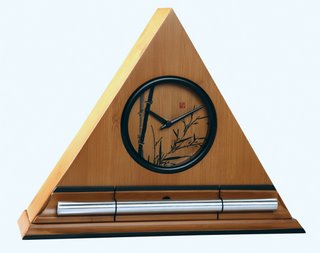 Zen Alarm Clock with Progressive Chime, set your clock as part of a relaxing bedtime routine Now & Zen’s Chime Alarm Clock Store
1638 Pearl Street
Boulder, CO 80302
(800) 779-6383
Posted in Bamboo Chime Clocks, Chime Alarm Clocks, Japanese Inspired Zen Clocks, Natural Awakening, Now & Zen Alarm Clocks, Progressive Awakening
« Previous Page — « Previous Entries
Next Entries » — Next Page »
|
|
|
|